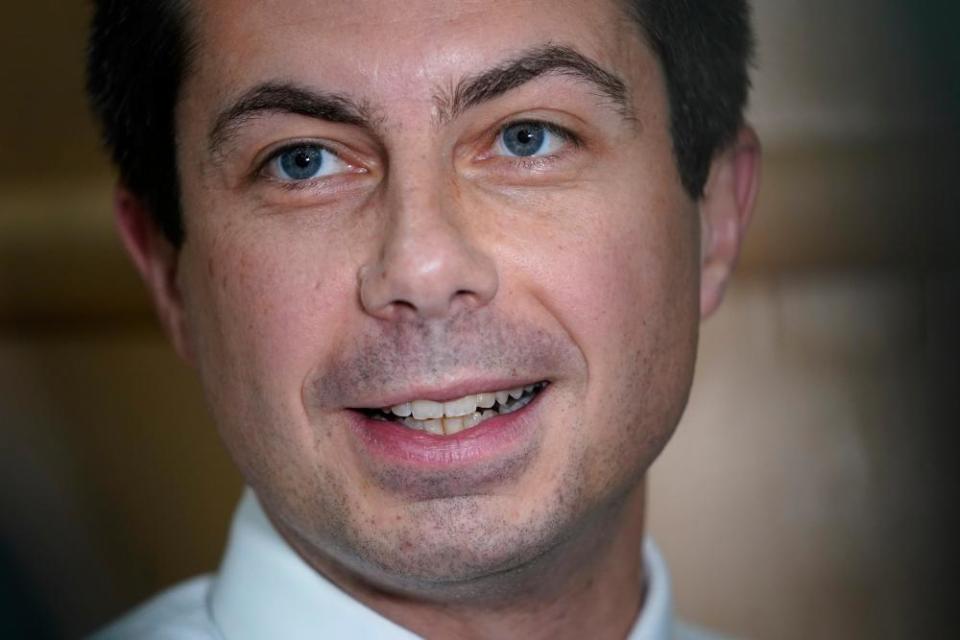Buttigieg releases McKinsey client list but details fail to satisfy critics

The Democratic 2020 candidate Pete Buttigieg has released a list of clients he worked on as a management consultant – but the move is unlikely to squash interest in the South Bend mayor’s past work for the controversial McKinsey company.
Related: Pete Buttigieg and McKinsey: why a background in business raises doubts
After growing and intense criticism from Democratic rivals and the media, Buttigieg this week released a list of his McKinsey clients, saying the giant firm had freed him from a non-disclosure agreement preventing him from discussing his work.
Buttigieg’s list includes more than half a dozen clients he worked for between 2007 and 2010. Among them are several environmental nonprofits, such as the Natural Resources Defense Council, and government agencies, like the Environmental Protection Agency, for whom he produced an energy efficiency report.
But the list also included clients that have already raised red flags for critics on the left, such as a healthcare firm that raised insurance rates and a Canadian company involved in a price-fixing scandal.
Secrecy had surrounded his time at McKinsey, a famously buttoned-lip employer whose work has drawn scrutiny following investigative reports of its role advising Purdue Pharma on how to “turbocharge” opioid sales, its role aiding foreign dictators in Russia and Saudi Arabia – and advising the Immigration and Customs Enforcement agency, recommending that Ice curtail spending on medical care and food for detainees.
Buttigieg has distanced himself from such client work on numerous occasions, and openly condemned the latest revelations about the firm’s work with Ice as “disgusting” and “extremely disappointing”.
On Monday, after the Guardian published a story about concerns with his background in business – followed by a New York Times story spotlighting his work at McKinsey, and a piece from the paper’s editorial board calling on the candidate to release names of his past clients – Buttigieg’s campaign released details of his work at the firm.
The disclosure that Buttigieg also worked on pricing at Canadian grocery chain Loblaws in 2008 led to a spate of theories that questioned whether he had been involved in a notorious bread price-fixing scandal in which Loblaws worked with other grocers and bread-makers in inflating bread prices nationally.
But on Wednesday, Buttigieg’s campaign said he had never worked on bread pricing specifically – his work had centered on price cuts, broadly defined. “He had nothing to do with this bread-pricing issue,” his campaign explained, “and had never heard of it until recently.” Rather, they said he was part of a team running analytics to determine where and how to make items more affordable, thereby increasing the chain’s customer base.
Loblaw has also denied any connection between the scandal and its decision to retain the firm.
Another of Buttigieg’s clients at McKinsey was Blue Cross Blue Shield of Michigan, which hit the headlines in January 2009 after it announced rate hikes and fired nearly 10% of its workforce.
In an interview with the Atlantic, Buttigieg said his work didn’t deal with premium costs, and noted he moved on from the job several years before job cuts were announced. Buttigieg described his work for the health insurance provider as “mostly on screens and paper. Math. Databases. PowerPoint presentations” and said that “rarely did he interact with employees at the clients he was advising”.

His work for BCBS of Michigan was the first he had done at the firm, and because of that, he insisted, he had been removed from the substance of it. He told the magazine it amounted to feeding math into “a PowerPoint that my manager would take and then bring to a partner who I imagine eventually presented something to a decision-maker”.
As for whether analysis he worked on helped lead to layoffs? “I don’t know what the conclusions were or what it led to. So it’s tough for me to say,” he said.
But that explanation was not enough for Wendell Potter, a former health insurance industry executive turned whistleblower against the industry, who previously worked with McKinsey.
“I think it’s important to understand that he wasn’t working solo. He was working as part of a team. And I can’t imagine that the company would have brought in a team just to look at things like travel reports, expense reports, and things like that. So I think it’s important to find out what part of the team are we looking at and what the reports were for the company,” he told the Guardian.
Other critics note that back in 2011, when Buttigieg was first running for mayor in South Bend, Indiana, he appeared to reference his time at BCBS as proof positive he knew how “to reimagine our budget from the bottom up”.
“One of the things I did for a living was just that,” Buttigieg said at a candidate forum back then. “I remember one client organization that was a large insurance firm that had grown in such a way that there was a great deal of duplication. Some people didn’t even know what the people working for them were doing.”
The layoffs at BCBS inspired lawsuits from the Michigan attorney general’s office, which in 2007 had published a report called Profits over People: The Drive to Privatize and Destroy the Social Mission of Blue Cross and Blue Shield, discussing a legislative push to hike premium rates.
Those findings trouble some progressives who, after Donald Trump successfully campaigned in swing states on a message of job-killing corporate trade deals, fear admissions like the one Buttigieg made in 2011 could leave Democrats vulnerable in 2020 – regardless of whether he realized his work at McKinsey would pave the path to job cuts or not.
Related: Republicans are turning impeachment into a carnival – and it could cost them | Geoffrey Kabaservice
“Pete is pretending that if he didn’t push a red ‘kill jobs’ button, his cold and detached work crunching numbers to make the case for layoffs didn’t count,” Adam Green of the Progressive Change Campaign Committee, which has endorsed Elizabeth Warren, told the Guardian.
“His admission that he rarely talked to the employees whose jobs he was number-crunching away, plus revelations about the big-money corporate donors he surrounds himself with now, send a signal to voters about who he listens to and advocates for.”
Buttigieg, however, believes he is sending a different message.
“These attacks are false and irresponsible,” the campaign said in a statement. “Pete’s work at Blue Cross Blue Shield consisted of three months of analyzing overhead expenditures – things like rent, utilities, and travel costs. Neither did his scope of work involve policies, premiums, or benefits. Because this was his first client study, it largely involved on-the-job training to develop skills in the use of spreadsheets and presentation software.”
The campaign continued: “We have now gone above and beyond any other candidate in this race in transparency. Our opponents can make this election about Pete’s first job out of school, and that’s their choice. We’re going to focus on a new kind of politics that unites Americans behind bold change like Medicare for All Who Want It and affordable college to all those who need it.”

 Yahoo News
Yahoo News 